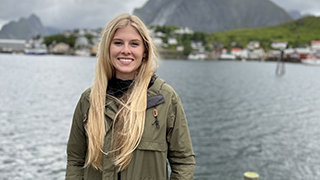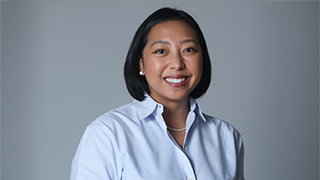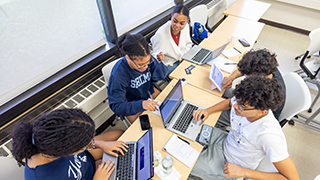All Things DiploLab with Dr. Joseph Huddleston - Seton Hall University
Friday, June 26, 2020

Professor Joseph Huddleston sees the DiploLab as way of helping students gain the research skills they'll need in their professional careers.
The Diplomatic Envoy recently spoke with Joseph Huddleston, Assistant Professor at the School of Diplomacy and founder of the DiploLab, to find out about the School of Diplomacy's newest research initiative.
Professor Huddleston has been the driving force behind the DiploLab, a project he started after finishing his first year at Seton Hall. To launch the lab, Huddleston worked closely with Courtney Smith, the School's acting dean, along with Martin Edwards, faculty chair and associate professor, as well as with several other faculty members.
Still in its early stages, the DiploLab has been operating since the fall semester in 2019. A pilot program ran the summer before to assess how the lab would function. Huddleston acknowledges that the program is still relatively small, mentioning that the process for launching this type of initiative is often slow-moving. He pointed to the Security and Political Economy Lab at the University of Southern California (USC), which was created when he was in his second year of graduate school there and is only now recruiting students. Despite the slow-going process, the DiploLab has had a strong start, according to Dean Smith.
At its core, the lab is a collaborative space where students work alongside faculty. Huddleston describes the lab --in its ideal form-- as a structure that not only allows students to work on faculty-led research but also to engage in other research among themselves, or consult with faculty members on their research questions.
Huddleston is currently writing a book examining how self-determination movements, de facto states, and separatist governments use diplomacy to attain their goals of recognition and independence. The lab currently has four students assisting Huddleston with research pertaining to his book. Their responsibilities include collecting news articles and turning them into an original quantitative data set and preparing literature reviews. The lab has several other projects in development, including student-led collaborations with Diplomacy's Center for Peace and Conflict. Huddleston hopes the lab will soon be able to publish student-authored works.
A hallmark of the DiploLab is that it is truly collaborative, which speaks to its future potential. Even at this early stage, students are getting tremendous opportunities in addition to being exposed to a learning culture and practicing their research skills. Daniela Maquera, a research assistant for the DiploLab, shared her views on the initiative. "Through the DiploLab, I am developing skills in effectively preparing and communicating professional-level research. Our work is a hands-on application of what we are learning in class to real life situations in the international relations field."
Huddleston went on to describe the lab's "culture of curiosity," and its purpose of exposing students to academic research. The lab's role, he said, is the "production of knowledge and policies." The DiploLab will also introduce students to faculty research and allow them to form relationships with academic experts at the School of Diplomacy. Furthermore, students will have a chance to gather skills that are useful beyond traditional academic work. Huddleston pointed out that businesses, non-profits, and political campaigns need people who can work with data. He hopes that the DiploLab will both expose them to and create new opportunities for students.
When asked about the DiploLab, Dean Smith echoed these sentiments, saying, "My hope is that the DiploLab initiative will foster greater opportunities for our students to engage in research and to practice skills that will be directly relevant in their future careers."
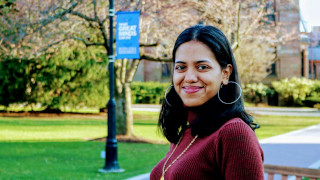
Harshana Ghoorhoo, a research assistant with the DiploLab, is now collaborating with a think-tank in Pakistan on a study of youth and political engagement.
Harshana Ghoorhoo, one of the lab's research assistants, attributes her work with the DiploLab to unique research opportunities. When asked about her experience, she stated, "working with Dr. Huddleston on his research has exposed me to current practices and how theories and models of understanding in international relations have evolved. As a result of my work with the DiploLab, I got the opportunity to research youth and political engagement with the Youth Center for Research, a think-tank based in Pakistan."
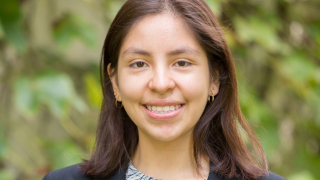
"Our work is a hands-on application of what we are learning in class to real life situations in the international relations field,” says, DiploLab research assistant, Daniela Maquera
Throughout his academic career, Huddleston has worked in research labs, both at USC and at Chapman University, which have helped define his career path. He hopes that the DiploLab can similarly help students, whether they are first-generation college students like him, or any student who may be trying to figure out their own path.
With the DiploLab, Huddleston has created a new opportunity which has the potential to become a central aspect of their research at the School of Diplomacy.
Categories: Research




